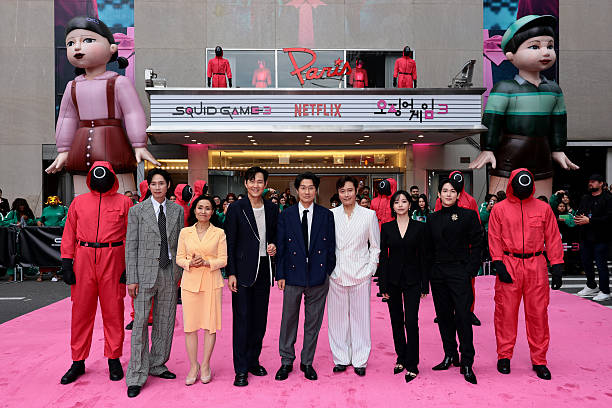When Squid Game exploded onto the global scene in 2021, many saw it as just another violent survival drama from South Korea. But those who dug deeper found that behind its flashy visuals and shocking plot twists lies a disturbing social commentary — one that speaks volumes about capitalism, inequality, and human nature.

More Than Just a Game
On the surface, Squid Game is about desperate contestants playing deadly versions of children’s games for a chance to win 45.6 billion won. But beneath this high-stakes competition lies a question: How far will people go when pushed to the edge of society? The show reveals that, under extreme pressure, people abandon morality, form fragile alliances, and betray even those closest to them.
Creator Hwang Dong-hyuk said he wrote Squid Game during his own financial struggles, inspired by the growing wealth gap in South Korea. That makes the series more than just entertainment — it’s a cry for help, a warning shot against unchecked greed.
A Global Message of Inequality
Though rooted in Korean culture, the show’s message is universal. Viewers from America to Brazil to Turkey saw reflections of their own societies. The faceless VIPs represent the global elite — watching the poor suffer for their amusement. The masked guards symbolize a system that blindly follows orders, even when it leads to bloodshed.
Meanwhile, the contestants come from all walks of life: a migrant worker, a disgraced investment banker, a North Korean defector. They highlight how systemic poverty doesn’t discriminate — and how the “game” of life is already rigged.
Capitalism’s Cruelest Game
One of the show’s most powerful moments is the tug-of-war episode. Here, strategy and teamwork briefly overcome brute strength — a metaphor for how marginalized communities can resist oppression if united. But such victories are rare. In the end, the game always favors the powerful.
The psychological aspect is even darker. The show suggests that people are so crushed by debt, shame, and hopelessness that they’ll voluntarily return to deadly games — even after escaping. That’s not just drama; it’s reality for many in modern capitalist societies where escape from poverty feels impossible.
Why It Resonated So Strongly
Squid Game became the most-watched Netflix show of all time not just because of its visuals, but because it captured a moment. Post-pandemic, global audiences were grappling with rising unemployment, inflation, and mental health crises. The series held up a mirror and said: “You are not alone in feeling trapped.”
Its success also reignited interest in Korean storytelling, which often blends tragedy, philosophy, and raw emotion in ways that Western series rarely do.
The Future of Squid Game and Social Fiction
With a second season on the horizon, expectations are high. Will it lean more into action or continue to explore the darker truths of society? Either way, Squid Game has opened the door for more socially aware storytelling in mainstream media.
From Parasite to The Glory, Korean creators are proving that entertainment can be gripping and meaningful.











